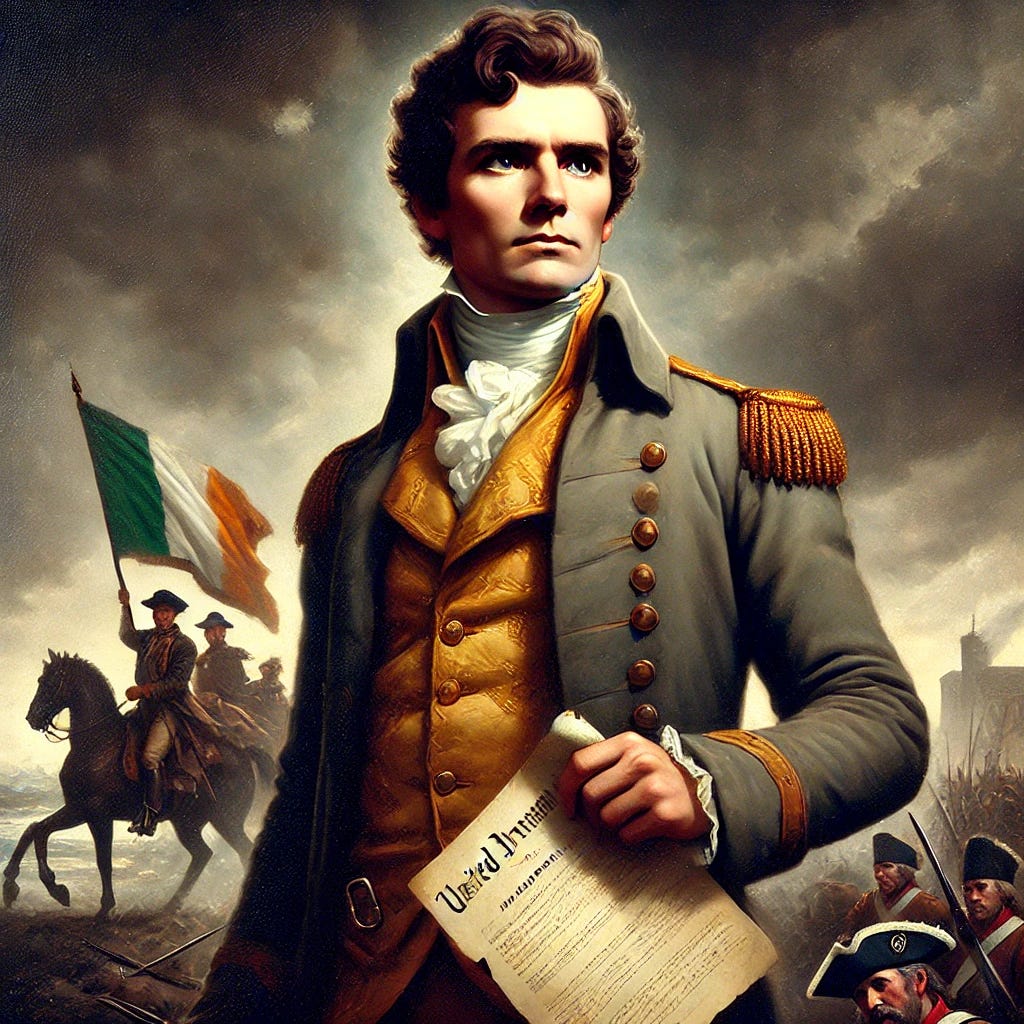Wolfe Tone: The Father of Irish Republicanism
The story of Theobald Wolfe Tone is one of passion, revolution, and tragedy. As a central figure in the 1798 Rebellion and the driving force behind the United Irishmen, Tone’s life and ideology shaped the foundations of modern Irish republicanism. He was a man who sought to break Ireland free from British rule, not just for Protestants or Catholics, but for all Irish people. His dream of a united, independent Ireland, though unfulfilled in his lifetime, continues to influence Irish history and politics to this day.
Early Life and Political Awakening
Theobald Wolfe Tone was born on June 20, 1763, in Dublin, Ireland, into a Protestant middle-class family. He attended Trinity College Dublin, where he studied law. However, his interest in politics quickly overshadowed his legal career. Tone was deeply influenced by the political ideas of the American and French revolutions, both of which championed the principles of liberty, equality, and fraternity.
During the 1780s and early 1790s, Ireland was controlled by a Protestant Ascendancy that wielded power over both the Catholic majority and many lower-class Protestants. The British Parliament maintained significant control over Irish affairs, despite a brief period of autonomy granted to the Irish Parliament in 1782. Tone saw this system as fundamentally unjust and sought a radical alternative: an Irish republic free from British influence.
The United Irishmen and the Push for Revolution
In 1791, Wolfe Tone co-founded the Society of United Irishmen, initially as a reformist movement seeking parliamentary representation for Catholics and an end to British interference. However, as British repression increased and revolutionary ideas spread, the society evolved into a radical republican organization that sought complete independence.
Tone’s belief in "the union of Protestant, Catholic, and Dissenter" became the foundation of the United Irishmen’s ideology. Unlike many nationalists of his time, he wanted to transcend religious divisions and create a republic where all Irish people—regardless of faith—could stand together against British rule. This was a revolutionary concept in a deeply sectarian society.
By the mid-1790s, it became clear that peaceful reform was impossible. The British government cracked down on dissent, banned the United Irishmen, and introduced severe laws to suppress any revolutionary activity. In response, Tone turned to France, seeking military assistance for an armed rebellion.
French Support and the 1798 Rebellion
Tone traveled to France in 1796 and successfully convinced the French Directory (France’s revolutionary government) to support an Irish uprising. Later that year, a fleet of 43 French ships carrying 15,000 troops set sail for Ireland under General Hoche. Their mission was to land in Bantry Bay and spark a nationwide rebellion. However, brutal weather prevented them from landing, and the mission failed without a single shot being fired.
Despite this setback, the United Irishmen pressed on, and in May 1798, rebellion finally broke out. However, it was poorly coordinated, lacking clear leadership and widespread popular support. The British authorities quickly crushed the rebellion, with particularly brutal suppression in Wexford, Ulster, and Dublin. Thousands of rebels were killed, and their leaders were either executed or imprisoned.
Desperate to keep the fight alive, Wolfe Tone returned to France and helped organize another invasion force. In September 1798, a small fleet of three French ships and 3,000 soldiers managed to land in Killala Bay, County Mayo. Despite some initial success, the uprising was swiftly defeated by British forces.
Tone himself was captured when his ship, Hoche, was intercepted by the British navy near Lough Swilly in October 1798. He was taken prisoner and brought to Dublin for trial.
Trial and Tragic Death
Wolfe Tone was tried by court-martial and sentenced to death by hanging. Rejecting the possibility of a pardon, he famously declared:
"From my earliest youth, I have regarded the connection between Ireland and Great Britain as the curse of the Irish nation, and felt convinced that while it lasted, this country could never be free or happy."
Determined not to give his enemies the satisfaction of executing him, Tone cut his own throat in prison on November 12, 1798. He lingered for several days before dying on November 19, 1798, at the age of 35.
Wolfe Tone’s Legacy
Wolfe Tone’s rebellion may have failed, but his legacy lived on. His vision of a secular, independent Irish republic inspired later nationalist movements, including:
Robert Emmet’s rebellion in 1803
Daniel O’Connell’s Catholic Emancipation movement
The Young Irelanders of 1848
The Fenians and the Irish Republican Brotherhood (IRB) in the 19th century
The 1916 Easter Rising, which ultimately led to Irish independence
Even today, Wolfe Tone is celebrated as the "Father of Irish Republicanism." His grave in Bodenstown, County Kildare, remains a site of pilgrimage for Irish nationalists. Every year, republicans from different factions gather to honor his memory, reaffirming their commitment to the cause he died for.
Conclusion
Theobald Wolfe Tone’s life was short but incredibly influential. His dream of an Ireland free from British rule, united across religious divides, and governed by its own people set the foundation for the Irish struggle for independence. Though he did not live to see an independent Ireland, his ideals shaped generations of revolutionaries and political leaders who carried his vision forward.
Today, as Ireland continues to evolve politically and socially, Tone’s call for unity and self-determination remains as relevant as ever. His legacy endures not just in history books but in the ongoing conversations about Irish identity, sovereignty, and the future of the island.




